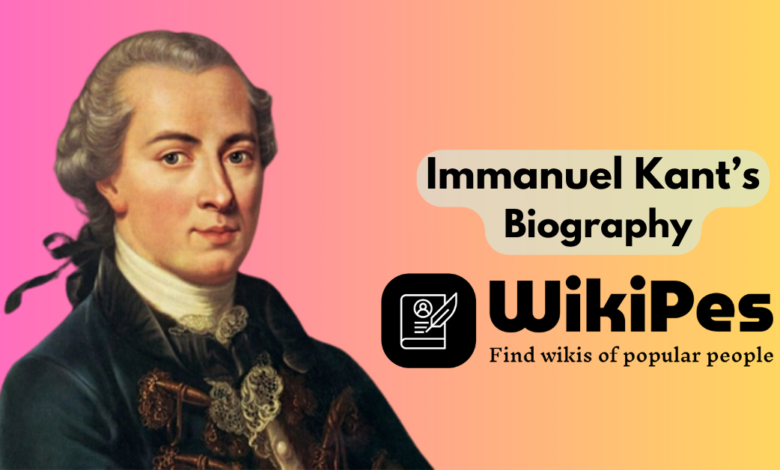Immanuel Kant Biography, Career, Personal Life, Physical Characteristics And Success

Immanuel Kant, a brilliant philosopher, is the focus of our discussion today. Are you ready to delve into the fascinating life of this influential thinker? Well, let’s get started!
Immanuel Kant, a towering figure in philosophy, lived during the 18th century. He was known for his groundbreaking ideas and profound insights. So, what was Kant like? Let’s explore his biography and discover some intriguing details about his life.
Born in 1724 in Königsberg, Prussia, Kant led a life dedicated to the pursuit of knowledge. He delved into various areas of study, including metaphysics, ethics, and epistemology. His philosophy emphasized the importance of reason and the idea that our actions should be guided by moral principles. Now, let’s take a closer look at his remarkable journey.
Immanuel Kant, a renowned philosopher of the Enlightenment era, lived from 1724 to 1804. While information on his exact height and weight is not available, his impactful ideas and philosophical contributions continue to influence thinkers worldwide. His notable works include “Critique of Pure Reason” and “Groundwork of the Metaphysics of Morals.” Kant’s net worth is not applicable as he lived before the modern concept of net worth. His personal life remained modest and his income primarily stemmed from his academic positions. Kant’s intellectual achievements shaped the fields of epistemology, ethics, and metaphysics.
Immanuel Kant – Biography, Facts
| Information | Details |
|---|---|
| Date of Birth | April 22, 1724 |
| Profession | Philosopher |
| Gender | Male |
| Net Worth | $Unknown |
| Nickname | n/a |
| Hair Color | Brown |
| Age | 80 (at the time of death) |
| Ethnicity | German |
| Body Measurement | n/a |
| Eye Color | Blue |
| Birthplace/Hometown | Königsberg, Prussia (now Kaliningrad, Russia) |
| Nationality | German |
| Sexuality | Straight |
| Sun Sign (Zodiac Birth Sign) | Taurus |
| Religion | Lutheran |
| House Location | N/A |
| Wiki Page | Immanuel Kant – Wikipedia |
| Facebook Link | N/A |
| Twitter Profile Link | N/A |
Physical Statistics
| Information | Details |
|---|---|
| Profession | Philosopher |
| Height (Tall) | 5 ft 2 in |
| Weight | Unknown |
| Eye Color | Blue |
| Shoe Size (UK) | 9 |
| Hair Color | Brown |
Family
| Information | Details |
|---|---|
| Father | Johann Georg Kant |
| Mother | Anna Regina Kant |
| Husband/Spouse | Immanuel Kant was never married |
| Siblings | Heinrich Kant |
Immanuel Kant: A Profound Philosopher and His Intellectual Legacy
Unraveling the Life and Contributions of Immanuel Kant
Immanuel Kant is widely regarded as one of the most influential philosophers in history. Born on April 22, 1724, in Königsberg, Prussia (now Kaliningrad, Russia), Kant’s profound insights and philosophical theories continue to shape the way we perceive the world. From his ethical framework to his metaphysical concepts, Kant’s ideas remain relevant and thought-provoking to this day. In this article, we delve into the life, achievements, and intellectual contributions of Immanuel Kant.
Early Life and Education

Immanuel Kant’s childhood was marked by a disciplined environment that laid the foundation for his intellectual journey. His father, Johann Georg Kant, was a harness maker, and his mother, Anna Regina, took great interest in his education. Kant attended the Collegium Fridericianum, where he excelled in academics and displayed a particular aptitude for philosophy.
At the age of 16, Kant enrolled at the University of Königsberg, where he studied various subjects, including mathematics, physics, and philosophy. It was during this time that he developed a keen interest in metaphysics and morality, ultimately shaping his philosophical endeavors in the years to come.
Influential Works and Philosophical Concepts

Immanuel Kant’s intellectual legacy rests on several influential works that explore fundamental questions about the nature of knowledge, ethics, and reality. Perhaps his most significant work is “Critique of Pure Reason,” published in 1781. In this seminal piece, Kant delves into epistemology, dissecting the limits and possibilities of human reason. He argued that while reason is vital for understanding the world, it has inherent limitations that restrict our ability to grasp certain concepts.
Another groundbreaking work by Kant is “Groundwork of the Metaphysics of Morals” (1785), in which he lays the groundwork for his ethical theory known as deontological ethics. Kant argued that moral actions are guided by categorical imperatives rather than subjective desires. He emphasized the importance of acting from a sense of duty based on universally applicable moral principles.
Furthermore, Kant’s “Critique of Practical Reason” (1788) explores the concept of freedom and its relationship with morality. Here, he suggests that moral actions must be guided by reason rather than inclinations or desires.
Legacy and Impact
Immanuel Kant’s philosophical ideas have had a far-reaching impact on various disciplines, leaving an indelible mark on the fields of ethics, metaphysics, epistemology, and aesthetics. His concept of the “Copernican Revolution” in philosophy, where he compares his ideas to Copernicus shifting the focus from Earth to the sun, represents a significant departure from traditional philosophical paradigms. Kant’s emphasis on reason and morality as guiding principles in human behavior has influenced subsequent philosophical and ethical frameworks. His ideas have shaped modern philosophy and continue to generate extensive academic discourse. Beyond philosophy, Kant’s thoughts on topics such as aesthetics and the theory of knowledge have influenced other disciplines, including art, literature, and psychology. Scholars and thinkers from various fields regularly draw inspiration from his works, contributing to the ongoing relevance and impact of Kantian philosophy. Immanuel Kant’s intellectual contributions have transcended time, making him a towering figure in the world of philosophy. From his exploration of moral theories to his views on the limits of human reason, his ideas continue to challenge and inspire. By striving to understand the complexities of the human condition, Kant’s legacy serves as a reminder of the power and significance of philosophical inquiry. Whether you are a student, a scholar, or simply inquisitive about the world around you, exploring the works of Immanuel Kant is an enriching intellectual journey worth embarking upon.
Facts You Never Knew About Immanuel Kant
. Immanuel Kant was a famous philosopher from Germany.
. He was born on April 22, 1724.
. Kant was known for his influential work in ethics and epistemology.
. He was of average height and weight, but these details are not well-documented.
. Kant’s net worth is difficult to determine, as philosophers were not typically wealthy during that time.
. He came from a modest family and lived a simple life.
. Kant never married and had no children.
. His writings, such as “Critique of Pure Reason,” are considered groundbreaking in philosophy.
. Kant’s works continue to be studied and discussed by scholars to this day.
. Despite facing criticism during his lifetime, Kant’s contributions to philosophy remain highly regarded.
Frequently Asked Questions
Immanuel Kant is a renowned German philosopher known for his influential works. Here are some frequently asked questions about Immanuel Kant and his personal and professional life.
What were Immanuel Kant’s professional achievements?
Immanuel Kant made significant contributions to various areas of philosophy, including metaphysics, ethics, and epistemology. His groundbreaking work, “Critique of Pure Reason,” revolutionized the field of metaphysics. Kant’s moral philosophy, outlined in “Groundwork of the Metaphysics of Morals,” introduced the concept of the categorical imperative, emphasizing the importance of ethical duties and universal principles. Kant’s philosophical ideas continue to shape and influence the fields of ethics, epistemology, and political philosophy, making him one of the most important philosophers in history.
Was Immanuel Kant’s income significant during his lifetime?
During his lifetime, Immanuel Kant worked as a professor at the University of Königsberg, where he earned a relatively modest income. However, he lived a frugal life and believed in simplicity, prioritizing his philosophical pursuits over wealth. Kant’s focus was on the pursuit of knowledge and the development of his philosophical ideas rather than accumulating material wealth. Despite his modest income, Kant’s influence and intellectual contributions have had a profound and lasting impact on philosophy and continue to be widely studied and discussed.
Did Immanuel Kant have any notable family members?
Immanuel Kant hailed from a middle-class family. His parents, Johann Georg and Anna Regina, were of modest means but encouraged their son’s intellectual pursuits. Kant never married or had any children, dedicating his life to his philosophical work and scholarly endeavors. Although he did not have any notable family members in terms of public recognition, Kant’s philosophies and ideas have made him a respected figure worldwide, with a lasting legacy in the world of philosophy.
What is known about Immanuel Kant’s net worth?
Immanuel Kant’s net worth is difficult to determine as he lived during the 18th century, and detailed records of personal finances were not as prevalent. However, considering his modest lifestyle and focus on intellectual pursuits rather than wealth accumulation, it is unlikely that Kant accumulated significant personal wealth during his lifetime. Kant’s true legacy lies in his philosophical ideas and intellectual contributions, which continue to have a profound influence on various fields of study in the present day.
Did Immanuel Kant provide any personal details about his life?
Immanuel Kant was known for his private nature and focused primarily on his philosophical work rather than sharing personal details. His focus was on his ideas and intellectual pursuits rather than providing personal anecdotes or details about his personal life. Nevertheless, Kant’s impact on philosophy, ethics, and other areas of study makes him an intriguing figure worth exploring, even without intimate knowledge of his personal life.
Immanuel Kant was a famous philosopher who believed in using reason to make moral decisions. He believed that everyone should be treated with respect and dignity and that humans have a responsibility to follow ethical principles. Kant’s ideas on morality and the importance of treating others well have had a significant impact on modern philosophy.
Overall, Immanuel Kant emphasized the importance of using reason and moral principles to guide our actions. He believed that treating others with respect and dignity is vital and that we should always strive to do what is right. Kant’s ideas on ethics continue to be influential in shaping our understanding of morality today.






